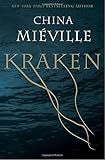This has been my year of reading genre-ously. There were a couple of dips into familiar but rarely visited genres – William Gibson’s lackluster new science fiction novel, Zero History, and Elmore Leonard’s dazzling new crime novel, Djibouti. If it was disappointing to see a gifted SF trailblazer struggling in mid-career, it was a genuine joy to see our greatest crime writer going strong as train smoke at the ripe age of 85.
 But after a lifetime devoted almost exclusively to reading literary fiction, my eyes were finally opened to the boundless possibilities of genre writing by the fantasy novelist China Mieville. When I decided to take the plunge, I did something I’ve been wanting to do for years but had never done before: I started with Mieville’s first novel, King Rat from 1998, and read his entire output in chronological order, finishing with his seventh and most recent novel, Kraken, from this year. I think Kraken is Mieville’s best novel yet, and this is what I wrote about the imaginary London he conjures in it: “Like all of his worlds, it is not merely plausible, it is engrossing precisely because it demolishes old notions of plausibility and writes its own. In other words, it’s an eye-opener, a revelation.”
But after a lifetime devoted almost exclusively to reading literary fiction, my eyes were finally opened to the boundless possibilities of genre writing by the fantasy novelist China Mieville. When I decided to take the plunge, I did something I’ve been wanting to do for years but had never done before: I started with Mieville’s first novel, King Rat from 1998, and read his entire output in chronological order, finishing with his seventh and most recent novel, Kraken, from this year. I think Kraken is Mieville’s best novel yet, and this is what I wrote about the imaginary London he conjures in it: “Like all of his worlds, it is not merely plausible, it is engrossing precisely because it demolishes old notions of plausibility and writes its own. In other words, it’s an eye-opener, a revelation.”
Re-reading those words, I was reminded of something Flannery O’Connor wrote about the demands placed on the writer of fantasy: “Fiction is an art that calls for the strictest attention to the real – whether the writer is writing a naturalistic story or a fantasy. I mean that we always begin with what is or with what has an eminent possibility of truth about it. Even when one writes a fantasy, reality is the proper basis of it. A thing is fantastic because it is so real, so real that it is fantastic… I would even go so far as to say that the person writing a fantasy has to be even more strictly attentive to the concrete detail than someone writing in a naturalistic vein – because the greater the story’s strain on the credulity, the more convincing the properties in it have to be.”
O’Connor cites Kafka’s “The Metamorphosis” as a story that lives up to these high standards. I would add the seven novels of China Mieville, which are fantastic because they are so real, and so real that they are fantastic. And pure reading pleasure.
 While I was writing the above, a fresh slab of genre arrived in the mail – Amos Walker: The Complete Story Collection. It was written by another Detroit crime writer, Loren D. Estleman, who is not a household name like Elmore Leonard, but deserves to be. Estleman and I have been pen pals for nearly 20 years and in that time I’ve read a dozen of his novels, including several built around Amos Walker, his delightfully gruff Detroit private eye. The new collection contains 33 stories and runs to 637 pages, which means I’ve got something to keep me warm through a long cold winter.
While I was writing the above, a fresh slab of genre arrived in the mail – Amos Walker: The Complete Story Collection. It was written by another Detroit crime writer, Loren D. Estleman, who is not a household name like Elmore Leonard, but deserves to be. Estleman and I have been pen pals for nearly 20 years and in that time I’ve read a dozen of his novels, including several built around Amos Walker, his delightfully gruff Detroit private eye. The new collection contains 33 stories and runs to 637 pages, which means I’ve got something to keep me warm through a long cold winter.
More from a Year in Reading 2010
Don’t miss: A Year in Reading 2009, 2008, 2007, 2006, 2005
The good stuff: The Millions’ Notable articles
The motherlode: The Millions’ Books and Reviews
Like what you see? Learn about 5 insanely easy ways to Support The Millions









